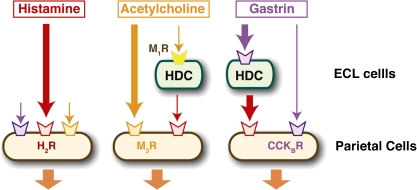Figure 3.
Roles of histamine in gastric acid secretion. Histamine, acetylcholine (muscarinic), and gastrin are major secretagogues in gastric acid secretion. Accumulating evidence suggests that acetylcholine and gastrin stimulate histamine release from ECL cells, which synergistically enhance the acid secretion through direct stimulation of parietal cells by these secretagogues. Massive and prolonged acid secretion by gastrin was found to require transcriptional activation of the HDC gene. Investigation using the HDC−/− mice revealed that histamine plays a critical role in gastrin-mediated acid secretion but not in muscarinic acid secretion.

